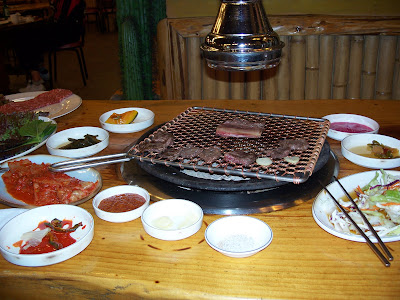 On Tuesday afternoon, my boss called me up on the phone and asked if I would like to go to Korea tomorrow. Without thinking it through, I replied with an affirmative. He then went to book the tickets as I thought about all the preparation I had to do in the next twenty four hours to prepare for this trip. Who would take care of my bird? When could I go pick up a guide? Where can I purchase some traveler's cheques? How will I make up for lost time at my Chinese Class. Eventually, it all worked out fine and I was on my way, twenty four hours later, to the land of Hanguel-speaking natives.
On Tuesday afternoon, my boss called me up on the phone and asked if I would like to go to Korea tomorrow. Without thinking it through, I replied with an affirmative. He then went to book the tickets as I thought about all the preparation I had to do in the next twenty four hours to prepare for this trip. Who would take care of my bird? When could I go pick up a guide? Where can I purchase some traveler's cheques? How will I make up for lost time at my Chinese Class. Eventually, it all worked out fine and I was on my way, twenty four hours later, to the land of Hanguel-speaking natives.I won't bore you too much with the specifics of the first forty-eight hours. Essentially, my boss and I met with each of our clients independently in Korea, learning more about their schools and devising ways in which we could help them. In the evenings, we sprinkled in a bit of tourism and culinary experimentation.
I would say that the single most enthralling element about Korea is their food. My boss recently admitted, much to both of our chagrin, that he actually preferred Korean food to Taiwanese food. I would not have such blasphemy present before me. I have sworn by Taiwanese food and I will continue to argue that Taiwanese food is Asian food at the zenith of its possibility. Except of stinky tofu. And maybe chicken butts. But regardless, this was a bold admission from a man who has devoted so much praise to our little island. This could only suggest that my taste buds were in for something quite extraordinary.

His hype was unnecessary- the food spoke for itself. While I will not say it surpasses a good beef noodle soup in Taiwan, I will say Korean's can be very proud of what they eat. Essentially, our dining experience revolved around one basic concept: grilling. A man's fantasy: sit around at your kitchen table with some burning charcoals in the middle barbecuing up some fresh meat. While the food was sumptuous, the sides contributed greatly to the feast. When ordering a rack of pork ribs or some braised beef, it always comes with a healthy portion of kimchee, salad, sauces, and countless other dishes to complement the central fan fare.
Every morning we woke up, after a night of gorging, made us regret eating so much meat and swearing off anything that oinks or moos for the rest of our lives. However, like men who don't learn from their hangovers, we were right back in the barbecues each night trying some chicken, spicy meat, and other delicious tenderloins. The grills were, quite possibly, the greatest things one could ever hope to find in their lives.

During dinner, naturally, we often gravitated toward a certain topic of discussion: would a restaurant like this actually survive in the United States? Would people enjoy cooking their own food? Would the restaurant be liable for someone who undercooked their meat and suffered food poisoning? I will say our estimation of the American psyche found them unprepared for this sort of cuisine, but we can hope that one day the states will be ready.
After dinner one night, my boss and I went to a local Hof, which is essentially a traditional Korean Bar. A small bar in th Bundang region just south a Seoul, this was full of hanguel speaking masters with little Engish ability. For example, when asking where the toilet was, I was given the bill instead. However, our ability to point got us what we wanted and our mastery of one Korean word, Dongdongju, whetted our whistle. Dongdongju is a traditional creamy rice wine. Usually served in a kettle and then poured into a wooden bowl (our bowls were metal as we were in a very local place not fit for tourists) it is a very strange drink. I almost felt like a kid again, sneaking a sip of my father's beer again. At first it was strange and revolting, but the taste lingered and suddenly there was new beauty in this very adult taste. Dongdongju has a tarty zing to it, almost as if it were carbonated. Ordering a squid pancake to go along with this drink (I picked around the squid), my boss and I drank up and rode the subway back to our hotel.

The following day, Saturday, found me left in Seoul while my boss went back to Taiwan. I wanted to get some sightseeing in at this point. I had already seen the Great East Gate, called Dongdamuen. Interestingly, the Korean language stems greatly from the Chinese Language. In the 15th century (it seems like everything happened in the 15th century for Korea, by the way) the scholards of the time possesed great power because they were literate and the commoners were not. Much of the writing was done in Chinese Characters, making much of the knowledge innaccessible to most. The Great East Gate is actually based on Chinese Characters 東 大 門, or Dong Da Men. Maybe I could pick up some Korean after Chinese study... Most likely not.

To be continued..., Michael.



No comments:
Post a Comment